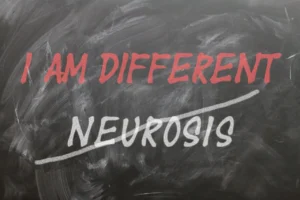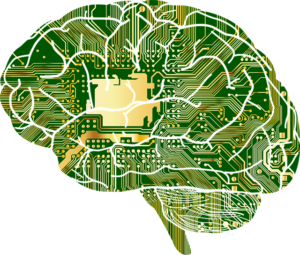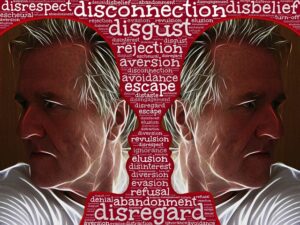The terms Depression, Neurosis, and Neurotic Depression are often used interchangeably to describe a range of mental health conditions. While they may share some similarities, there are important differences between these conditions that are important to understand. If you are struggling with symptoms of depression or anxiety, it is important to have a clear understanding of what you are experiencing so that you can seek the appropriate treatment, otherwise ask your therapist explain the differences to you.
DEFINITIONS
Depression
“Depression” (formerly referred to as Depression Neurosis) is a common mental health condition that is characterized by feelings of sadness, hopelessness, and a loss of interest in activities that were once enjoyable. You may experience fatigue, lack of energy, and difficulty sleeping or staying asleep. You may also experience changes in appetite, weight gain or loss, and physical symptoms such as headaches or stomach problems. Depression can also cause feelings of worthlessness, guilt, and hopelessness.

Neurosis
Neurosis, on the other hand, is a term that is used to describe a range of anxiety disorders that are characterized by excessive worry, fear, and nervousness. The primary causes of neurosis are not fully understood, but it is believed that a combination of genetic, environmental, and psychological factors may contribute to its development. Some common risk factors include a family history of mental illness, childhood trauma or abuse, and chronic stress or anxiety.
Neurotic Depression vs Psychotic Depression
Neurotic depression is a unique type of depression that is determined by pre-existing patterns of emotional instability and mental habits. Neurotic depression is often caused by unresolved conflicts and emotional distress, and can lead to symptoms such as hopelessness, low energy, apathy, and slow motor function. It is often characterized by a sense of inner turmoil, anxiety, and stress. You may experience feelings of panic, distress, and worry. An example of neurotic depression might be an individual who has experienced a traumatic event, such as the death of a loved one or a serious illness. Over time, the individual may develop persistent feelings of sadness, hopelessness, and despair that interfere with their ability to function in daily life.

In some extreme cases, neurotic depression can lead to hallucinations and delusions. You may experience obsessive thoughts that are difficult to control. It is important to seek urgent help if you experience any of these symptoms. Neurotic depression is usually a milder form of depression that is often caused by prolonged emotional stress or trauma. In contrast, psychotic depression is a more severe form of depression that is characterized by hallucinations, delusions, and other symptoms of psychosis. Individuals with psychotic depression may experience a break from reality and may require hospitalization or other intensive treatment.
CAUSES
Causes of Depression
Depression is a type of depression that is caused by a combination of genetic, environmental, and personality factors. According to Mayo Clinic, depression can be caused by changes in brain chemistry, hormones, and genetics. People with a family history of depression are more likely to develop the condition themselves.
In addition to genetics, personality traits can also contribute to depression. People who have a neurotic personality are more likely to develop depression. Neuroticism is a personality trait that is characterized by anxiety, moodiness, and emotional instability.
Stressful life events can also trigger depression. These events can include the death of a loved one, divorce, financial problems, or a serious illness. People who have a history of trauma or abuse are also at a higher risk for depression.

Causes of Neurotic Depression
Neurotic depression is a unique type of depression that is determined by pre-existing patterns of emotional instability. According to Choosing Therapy, neurotic depression is characterized by a group of symptoms that include general unhappiness, hopelessness, low energy, low mood, apathy, fatigue, and slow motor function.
People with neurotic depression often have a history of emotional instability and may have difficulty managing stress. In addition to personality factors, stress will also play a role in the development of neurotic depression. People who experience chronic stress are more likely to develop the condition.
HELPFUL THERAPIES
Both depression and neurotic depression are types of depressive disorders that can be treated with quite a variety of therapies. In addition to cognitive behavioral therapy (CBT), there are several other therapies that can assist in treating these disorders. Some of these therapies include:
- Psychodynamic therapy
- Mindfulness-based cognitive therapy (MBCT)
- Behavioral activation therapy (BAT)
- Mindfulness-based cognitive therapy
- Acceptance and commitment therapy (ACT)
- Dialectical behavior therapy (DBT)

It is important to note that while these therapies can be effective, they may not work for everyone. It is essential to work with a mental health professional to determine the best course of treatment for your specific needs taking into account your background and history of events which will be unique.
At Mind Renew we utilize any of these therapies that suit the client for their particular situation, sometimes in combination, depending on the needs of the client.
THE EFFECTIVENESS OF DRUGS PRESCRIBED
Antidepressants such as selective serotonin reuptake inhibitors (SSRIs) and tricyclic antidepressants (TCAs) have been said to be effective in reducing symptoms of depression especially for the short term and in situations where medical intervention is required to help reduce severe symptoms. However, it is important to note that medication alone is not usually enough to treat depression.
In addition to medication, therapy can be very beneficial in treating depression. Cognitive-behavioral therapy (CBT) is the most common form of therapy used to treat depression. CBT helps individuals identify negative thoughts and behaviors and replace them with more positive ones. Other forms of therapy, such as interpersonal therapy (IPT) and psychodynamic therapy, may also be helpful in treating depression using a different strategy.
For treating neurotic depression, therapy is often the first line of treatment rather than medication. However, in some cases, medication may also be recommended for treating neurotic depression.
CBT can be effective in treating neurotic depression by helping individuals identify and change negative thought patterns. Additionally, psychodynamic therapy can help individuals explore the underlying causes of their neurotic symptoms and develop coping mechanisms to manage them.
CAN EXERCISE AND COACHING HELP?
Yes.
Apart from CBT, there are other therapies that can be used to assist in treating both depression neurosis and neurotic depression. These include:
- Support groups: Joining a support group can provide individuals with a sense of community and support, which can be beneficial in managing symptoms of depression.
- Exercise: Regular exercise has been shown to be effective in reducing symptoms of depression and improving overall mental health.
- Coping strategies: Developing healthy coping strategies, such as mindfulness meditation or journaling, can help individuals manage symptoms of depression and improve their overall well-being.

In order to determine the best treatment approach for depression neurosis or neurotic depression, it is important to first consult with a doctor or mental health professional. They can provide a thorough evaluation and develop a personalized treatment plan that meets your specific needs and goals. If you cannot find a doctor to do that then reach out directly to a mental health professional to put together your mental health treatment plan for you.
Don’t get hung up on labels- depression is a symptom not just a disorder
The Statistical Manual of Mental Disorders DSM-IV, published in 1994, further refined the diagnostic criteria for MDD. It eliminated the use of the term “neurotic depression” and replaced it with the diagnosis of “depressive disorder not otherwise specified” (DDNOS). The DSM-5, published in 2013, replaced DDNOS with “other specified depressive disorder” (OSDD) and “unspecified depressive disorder” (UDD).
Depressive neurosis is no longer recognized as a distinct mental disorder in modern diagnostic systems such as the DSM-5. Instead, it is considered a subtype of depressive disorder, which includes major depressive disorder, persistent depressive disorder, and other forms of depression.

Quite often how a person presents as typically depressed is only a symptom of unresolved past trauma for example post traumatic stress disorder (PSTD) or if complex CPSTD, which was never treated.
There could also be physical causes for the same symptoms of depression, for example extreme hormonal imbalance, genetic issues causes low uptake or conversion of Vitamin B, chronic physical pain etc. that affects the nervous system which in turn produces depression symptoms. In such cases other strategies should be considered including pain management and physical therapies.
BEST THERAPIES TO ASSIST DEPRESSION
Apart from CBT, other therapies that the writer recommends as most helpful for treating depression include:
- TRTP (The Richards Trauma Process)
- Acceptance and commitment therapy (ACT)
- Dialectical Behavioural Therapy (DBT)
- Art Therapy

It is important to note that the most effective treatment for depression often involves a combination of therapies tailored to the individual’s specific needs and circumstances.
WHAT IS TRTP?
3 Stage Process -Finished in just 1 Month
TRTP™ Therapy resolves trauma related issues – quickly, safely and effectively, with a 3 step process. These trauma-related issues include PTSD, anxiety and depression. It helps individuals overcome chronic emotional dysregulation without retraumatizing to the extent of reliving the past. The therapy is heavily guided by the therapist and not like traditional “talk therapy” where the client keeps repeating all the details of past distressing events. TRTP therapy is a holistic and gentle approach that provides a supportive environment for individuals to heal, grow, and thrive. As it can be fully completed in one month it is ideal for people with acute or situational stress, anxiety or depression to get a solution in a short time span.
The Ideal Online Therapy
There is no need to have TRTP sessions in person; in fact sessions via video conferencing are highly effective because they minimise distractions, have a better audio receptive for the TRTP technique, and help the client to be at ease in their own home.
Book a free Discovery Call
If you would like a complimentary no obligation free introduction telephone call to see if TRTP is right for you and have the chance to ask any questions, you can book here: I want to book a free introduction call

